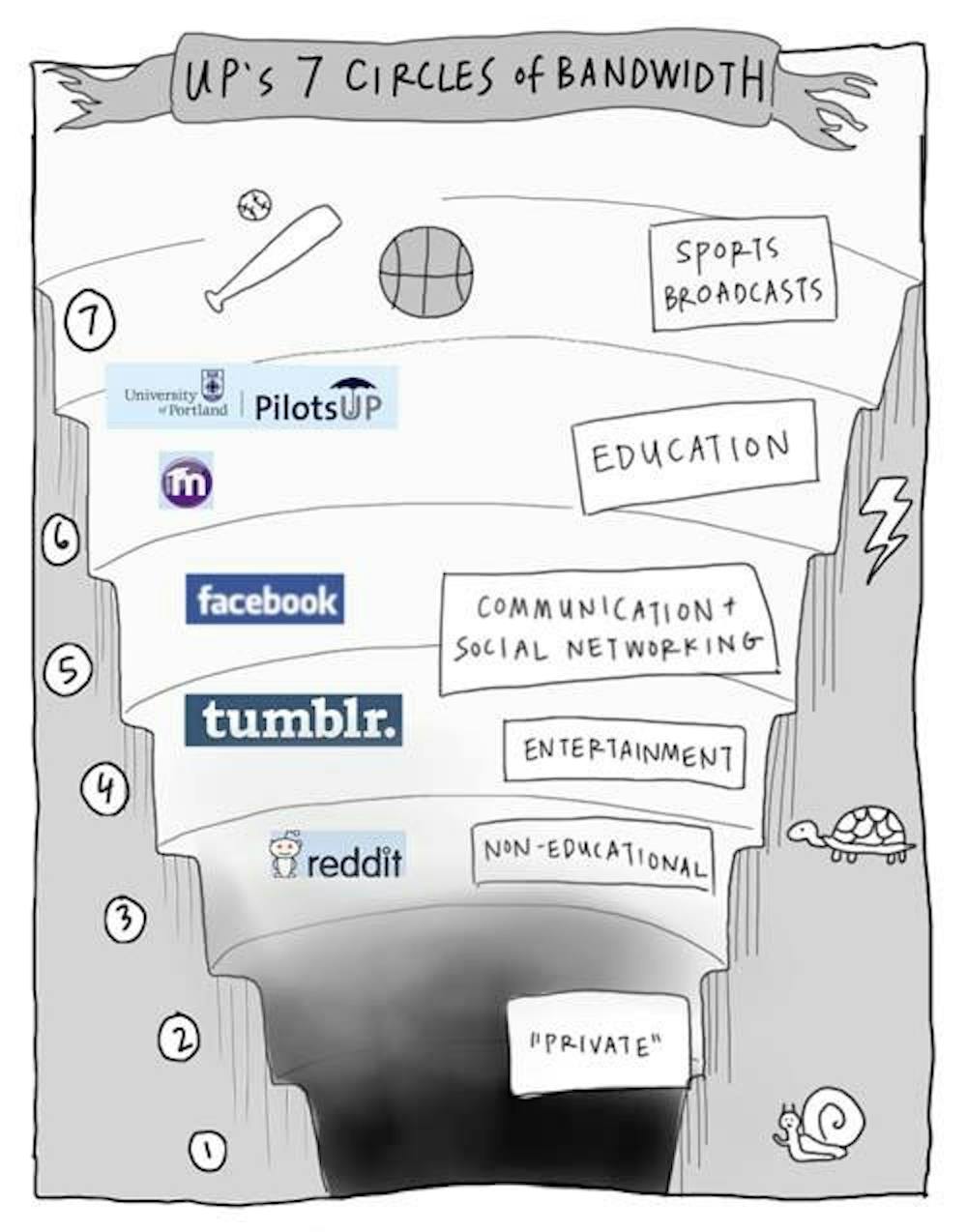Web Administrations uses a program that allocates Internet bandwidth depending on the site
Internet bandwidth on campus is divided into seven different categories. University websites will load faster, but social media websites will load slower. The University hopes to have Wi-fi ability from the Bluff to Fields and Schoenfeldt Hall soon. (Ann Truong | THE BEACON)
By Philip Ellefson, Staff Writer ellefson15@up.edu
If you are using wireless Internet on campus and you find that Facebook runs slower than Moodle, there's a reason for that.
Since the beginning of this year, the Office of Web and Administrative Systems has been using a system to distribute bandwidth based on the educational relevance of sites students are accessing. This means educational websites load faster than entertainment sites.
"We categorize it, we look at what you're doing," Network Engineer Tom Ank said. "The less related to school it is, the less bandwidth you get."
So students' computers will load UP's homepage much faster than the front page of Reddit. Some students have noticed that different sites run at different speeds.
"It's completely situational, depending on what site you're on," freshman Tyler Hunt said.
Bandwidth in categories
In this system for distributing bandwidth, there are seven categories of priority. Category seven gets the most bandwidth and is reserved for outgoing broadcasts of special events like sports games. UP gives these events the most bandwidth to ensure a smooth broadcast.
Categories six and five include sites related to education, like Moodle and up.edu.
Category four includes sites used for communication, including social networking sites. Facebook, the most accessed site on campus, is in this category.
"[Facebook]'s not necessarily high-priority, but it's more important than, well, trash," Ank said.
Sites used for entertainment, like Netflix, are also ranked in category four. Ank said that although these sites might seem frivolous, they are important to students' wellbeing.
"You've had a hard day, you're in your room. You should be able to watch a movie. Blow off a little steam," Ank said.
In category three are non-educational sites that are not used primarily for communication. This category includes sites like the Internet Movie Database.
Categories one and two are reserved for more private websites, Ank said.
"[In category two] we get down to the more risqué sites," Ank said. "Down into the lowest category, that's pretty much porn."
Ank said that popular gaming websites like Call of Duty do not fit into a specific category. He said game playing is given "general" bandwidth and does not affect other online traffic.
Private sites still private
Even though explicit sites may load more slowly than email, Ank said there is no reason for students to be afraid of anyone finding out what sites they've accessed.
"I can look at the University as a whole and say, 'We're going to these types of sites,'" Ank said. "For an individual, it's really cumbersome. We don't want the potential for that kind of abuse."
While Hunt thinks the system works most of the time, he is concerned that it may not always give the right amount of bandwidth.
"At what point is Google a research engine, and at what point is it a screw-around site?" Hunt said.
Ank said sites like Google are not a problem because they use very little data. These sites are categorized as general traffic and have little effect on overall wireless traffic.
If a student is having problems accessing a certain website, Ank said web administration can readjust the bandwidth.
More upgrades planned
The system was introduced at the beginning of the year, when the on - campus Wifi was updated. Ank said that just a year and a half ago UP's network had only 100 megabits per second of bandwidth. Now, the Office of Web and Administrative Systems has 500 megabits available to Internet users on the network.
Ank said the department recently set up Wifi in Howard Hall.
Further development is on the way for the network, too. The Office of Web and Administrative Systems hopes to double the bandwidth available on campus by this fall. Ank said the office also plans to expand coverage on campus, especially in outdoor areas like the academic quad, Merlo Field and along The Bluff.
"Our ultimate goal is to have you be able to walk from The Bluff all the way to Fields and Schoenfeldt and have Wifi most of the way," Ank said.
- Laura Frazier contributed to reporting








